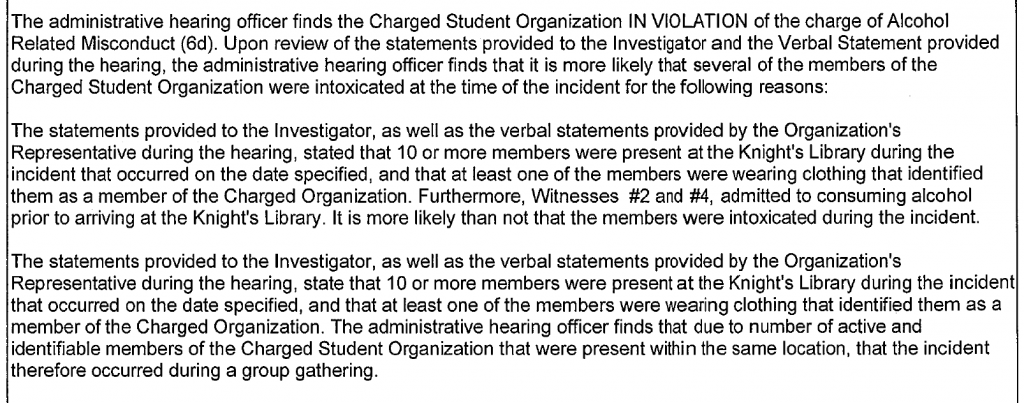Findings:
Disruptive Conduct:
In Violation — (3c): Engaging in obscene behavior or indecent conduct.

Alcohol-Related Misconduct:
In Violation — (6d): Behavior under the influence of alcohol.

Harmful Behavior:
Not in violation — (4a): Physical violence towards another person or group.
Harmful Behavior:
Not in violation— (4c): Bullying:
Defined as behavior of any sort (including communicative behavior) directed at another, that is severe, pervasive, or persistent, and is of a nature that would cause a reasonable person or group in the target’s position substantial emotional distress and undermine his or her ability to work, study, or participate in University life or regular activities, or which would place a reasonable person in fear of injury or death.
‘More Likely than Not’:
The Golden Rule Student Handbook — annually published set of guidelines and responsibilities that UCF students are expected to uphold — has a set of rules specific to registered student organizations and groups on campus known as “Organizational Rules of Conduct.”
The State University System of Florida — a system of governance that works alongside the Florida Board of Governors — oversees all public universities in Florida and sets regulations the schools must follow.
The Office of Student Conduct uses a standard known as a “preponderance of evidence” for investigation and conduct proceedings, according to the Golden Rules.
The rules state it is based on a “more likely than not” threshold — this implies violations of the UCF Rules of Conduct, or Organizational Rules of Conduct, are more likely to have occurred than not to have occurred.
This differs from the traditional courts in the American criminal justice system where a “presumption of innocence” is the working standard.
The evidentiary standard of “preponderance of evidence” is cited in the Florida Board of Governors’ active regulation on “Student Conduct and Discipline” and all state universities must use this standard.
“All hearings shall be conducted on the basis that the charged registered student organization is not in violation until the preponderance of evidence proves otherwise,” the Golden Rules state. “At a student conduct organizational hearing, the technical rules of evidence applicable to civil and criminal cases shall not apply. The burden of proof in a student conduct hearing is not on the registered student organization charged with a violation of the Organizational Rules of Conduct.”
The Office of Student Conduct states it follows due process and “equal opportunity to present relevant witnesses and evidence throughout the conduct process,” the rules state.
Although neither a student nor a registered student organization has the right to an attorney during a formal hearing, organizations can bring and consult an adviser.
The adviser may not speak on behalf of the organization, but the organization’s officers may consult with the adviser as long as the adviser isn’t directly related to the case.



